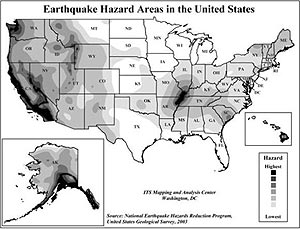Natural Disasters
Earthquakes
Always call 911 if you are in immediate danger and need emergency help.

Information on this page will help you understand environmental dangers related to earthquakes, what you can do to prepare and recover. It will also help you recognize possible environmental hazards and learn what you can do to protect your and your family’s health. Find general, non-emergency information about earthquakes from the U.S. Geological Survey.
Prepare for an earthquake
Other sites related to preparedness
- FEMA: Six ways to plan ahead
- Ready.gov: Make a plan for natural disasters
Earthquakes strike suddenly, violently and usually without warning. Identifying potential hazards ahead of time and advance planning can reduce the dangers of serious injury or loss of life from an earthquake.
Drinking water and food:
- Make a kit of supplies. Keep at least a 3-day water supply per person -and don't forget pets. What you can do to protect your household well.
- Prepare food supplies for an emergency. Get a fridge thermometer to be sure of safe storage temperatures if you lose electricity. Freeze extra containers of water ahead of time. Use ice chests in case power is out for more than four hours.
For water and wastewater facilities:
Suggested activities to help facilities prepare. Please note, the linked information is written for hurricane preparedness but much of it will still apply to earthquake preparedness activities.
Planning for disaster debris:
Damage from an earthquake depends on the size, extent, and other factors. Damage debris can include destroyed structures, hazardous waste, green waste, or personal property. More information
Chemical or fertilizer storage:
Properly designed or modified storage facilities enhance worker safety and minimize the risk contamination.
Other sites related to earthquakes
FEMA: What to do during an earthquakeDuring an earthquake
Be aware that some earthquakes are actually foreshocks and a larger earthquake might occur. Earthquakes in coastal areas can cause a tsunami.
Recover after an earthquake
After an earthquake, expect aftershocks. Stay away from damaged areas. Clean up spilled medicines, bleaches, gasoline, or other flammable liquids immediately.
Other sites related to recovery
- FEMA: What to do after an earthquake
- FEMA: Recovering from disasters
- Ready.gov: Natural disasters
- CDC: Earthquakes
People get sick or die each year from carbon monoxide or "CO" poisoning due to unsafe use of generators.
- ALERT: Generator exhaust is toxic. Always put generators outside well away from doors, windows, and vents. Never use a generator inside homes, garages, crawlspaces, sheds, or similar areas. Carbon monoxide (CO) is deadly, can build up quickly, and linger for hours. More information.
- Listen: Public Service Announcement about carbon monoxide (also en español)
- en español: Proteja su vida y la de su familia: Evite el envenenamiento con monóxido de carbono (español) - conozca los síntomas del envenenamiento con monóxido de carbono. | Más: Tormentas de nieve y hielo
Indoor air:
Broken gas lines greatly increase the risk of fire, explosion, or poor air quality. If you smell gas, open windows and shut off the main gas line. Notify the utility or other authorities.
ALERT
Boil Drinking Water
If your water may not be safe, bring drinking water to a rolling boil for 1 minute to kill water-borne diseases.
Drinking water and food:
- Boiling water information – To kill all major water-borne bacterial pathogens, bring water to a rolling boil for 1 minute. Boil 3 minutes at elevations above 5280 ft (1 mile or 1.6 km). Getting and disinfecting water.
- Dehydration danger for older adults – Make sure older adults have enough good drinking water. Older adults may feel thirsty less, and dehydration can be life threatening to an elderly person.
- What to do about water from household wells after a flood – Do not turn on the pump due to danger of electric shock. Do not drink or wash with water from the flooded well.
For water and wastewater facilities:
Suggested activities to help facilities recover from severe weather conditions. Please note, the linked information is written for hurricane recovery but much of it will still apply to earthquake recovery activities.
Pesticides, chemical, and oil spills, hazardous waste:
- Call the National Response Center 1-800-424-8802 (24 hours a day every day). For those without 800 access, please call 202-267-2675.
- Industries and businesses that encounter spills or discharges in the aftermath should contact the National Response Center immediately. You or your organization may have legal requirements for reporting or for taking other actions, depending on the spill.
- National Pesticide Information Center: 1-800-858-7378. Pesticide contacts
- General information about environmental emergencies
What to do with disaster debris:
Disasters can generate tons of debris, including building rubble, soil and sediments, green waste (e.g., trees and shrubs), personal property, ash, and charred wood. How a community manages disaster debris depends on the debris generated and the waste management options available. Burying or burning is no longer acceptable, except when permission or a waiver has been granted, because of the side effects of smoke and fire from burning, and potential water and soil contamination from burial. Typical methods of recycling and solid waste disposal in sanitary landfills often cannot be applied to disaster debris because of the large volume of waste and reluctance to overburden existing disposal capacity. More information
Disposing of debris from FEMA
Post-disaster clean-up and renovation:
Natural disasters such as tornadoes, hurricanes or floods often result in the need for emergency renovations to damaged homes and other structures. When common renovation activities like sanding, cutting, and demolition occur in structures that contain lead-based paint, they can create lead-based paint hazards, including lead-contaminated dust. Lead-based paint hazards are harmful to adults, particularly pregnant women, and children.
